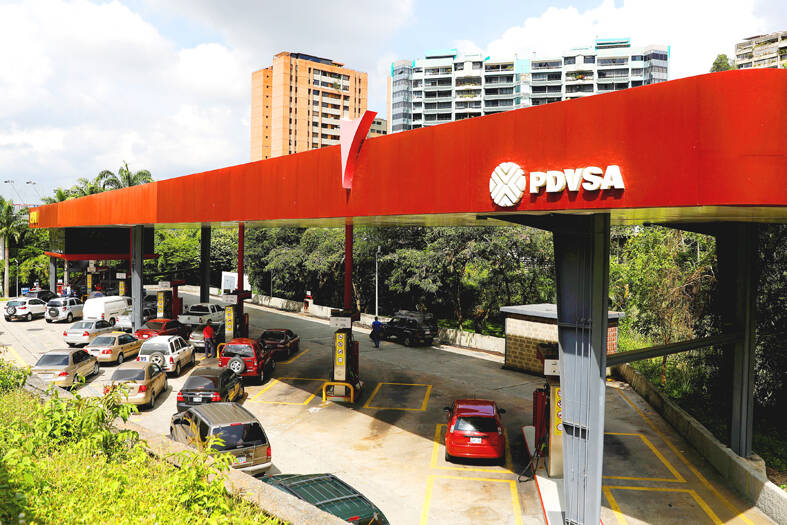The US government has notified foreign partners of Venezuela’s state oil company Petroleos de Venezuela SA (PDVSA) of the imminent cancelation of authorizations that allow them to export Venezuelan oil and byproducts, sources close to the decision by US President Donald Trump’s administration said on Saturday last week.
In recent years, former US president Joe Biden’s administration granted the authorizations to secure Venezuelan oil for refineries from Spain to India as exceptions to the US sanction regime on the South American country.
The companies that had received licenses and comfort letters from Washington include Spain’s Repsol SA, Italy’s Eni SpA, France’s Maurel & Prom Co, India’s Reliance Industries Ltd and US Global Oil Terminals LLC.

Photo: Reuters
Most companies had already suspended imports of Venezuelan oil following Trump’s imposition last week of secondary tariffs on buyers of Venezuelan oil and gas, according to sources and vessel tracking data.
The combination of tariffs and license cancelations to enforce sanctions is expected to squeeze Venezuela’s oil exports in the coming months, after they began to decline this month, data showed.
Last month, Venezuela exported 910,000 barrels per day of crude and fuel, more than January’s 867,000 barrels per day.
Similar measures by Trump’s first administration in 2020 knocked down Venezuela’s oil output and exports, creating the need for PDVSA to use intermediaries to allocate cargoes to China and leading to a pact with Iran. Those middlemen still do business with PDVSA.
Last month, Trump said a key license to US producer Chevron Corp to operate in Venezuela and export crude to the US would be canceled. Days later, the US Department of the Treasury ordered the company to wind down Venezuelan operations, and last week extended the deadline to May 27.
The withdrawal of the most important US license for Venezuela’s energy industry has sent a strong signal of Washington’s policy change toward Venezuela, as Trump’s administration also curbs migration, with a special focus on Venezuelans illegally in the US.
Following reports by international observers of irregularities in Venezuelan President Nicolas Maduro’s re-election last year, Trump has ramped up pressure on his government while accusing him of failing to make progress on electoral reforms and migrant returns.
It was not immediately clear if all PDVSA partners were given the same May 27 deadline to wind down operations. The terms of Chevron’s license termination also have not been completely clarified.
US Secretary of State Marco Rubio this month said that foreign oil companies in Venezuela would receive new guidance.
Maduro has criticized the sanctions, saying they amount to an “economic war.”

Taiwan will prioritize the development of silicon photonics by taking advantage of its strength in the semiconductor industry to build another shield to protect the local economy, National Development Council (NDC) Minister Paul Liu (劉鏡清) said yesterday. Speaking at a meeting of the legislature’s Economics Committee, Liu said Taiwan already has the artificial intelligence (AI) industry as a shield, after the semiconductor industry, to safeguard the country, and is looking at new unique fields to build more economic shields. While Taiwan will further strengthen its existing shields, over the longer term, the country is determined to focus on such potential segments as

UNCERTAINTY: Innolux activated a stringent supply chain management mechanism, as it did during the COVID-19 pandemic, to ensure optimal inventory levels for customers Flat-panel display makers AUO Corp (友達) and Innolux Corp (群創) yesterday said that about 12 to 20 percent of their display business is at risk of potential US tariffs and that they would relocate production or shipment destinations to mitigate the levies’ effects. US tariffs would have a direct impact of US$200 million on AUO’s revenue, company chairman Paul Peng (彭雙浪) told reporters on the sidelines of the Touch Taiwan trade show in Taipei yesterday. That would make up about 12 percent of the company’s overall revenue. To cope with the tariff uncertainty, AUO plans to allocate its production to manufacturing facilities in

COLLABORATION: Given Taiwan’s key position in global supply chains, the US firm is discussing strategies with local partners and clients to deal with global uncertainties Advanced Micro Devices Inc (AMD) yesterday said it is meeting with local ecosystem partners, including Taiwan Semiconductor Manufacturing Co (TSMC, 台積電), to discuss strategies, including long-term manufacturing, to navigate uncertainties such as US tariffs, as Taiwan occupies an important position in global supply chains. AMD chief executive officer Lisa Su (蘇姿丰) told reporters that Taiwan is an important part of the chip designer’s ecosystem and she is discussing with partners and customers in Taiwan to forge strong collaborations on different areas during this critical period. AMD has just become the first artificial-intelligence (AI) server chip customer of TSMC to utilize its advanced

Chizuko Kimura has become the first female sushi chef in the world to win a Michelin star, fulfilling a promise she made to her dying husband to continue his legacy. The 54-year-old Japanese chef regained the Michelin star her late husband, Shunei Kimura, won three years ago for their Sushi Shunei restaurant in Paris. For Shunei Kimura, the star was a dream come true. However, the joy was short-lived. He died from cancer just three months later in June 2022. He was 65. The following year, the restaurant in the heart of Montmartre lost its star rating. Chizuko Kimura insisted that the new star is still down